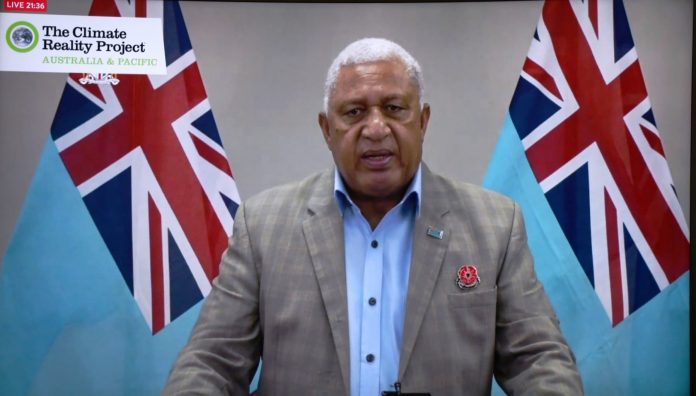Pacific Island nations are tired of reiterating their people’s suffering and applauding their resilience in the face of climate change and will demand real action from developed nations at upcoming climate talks, Fiji’s Prime Minister Voreqe Bainimarama has warned.
“We refuse to be the proverbial canaries in the world’s coal mine, as we are so often called,” said Bainimarama in an angry but poised speech at the forum hosted by Al Gore’s Climate Reality Project to discuss the November COP26 climate talks in Glasgow.
“We want more of ourselves than to be helpless songbirds whose demand serves as a warning to others.”
He called on Pacific nations not to allow world leaders to “sneak in and out of Glasgow without making a single serious commitment.”
Bainimarama said Pacific Island nations will demand that, at Glasgow, wealthier countries make good on the commitment they made during the Paris talks to extend to developing nations US$100 billion in finance annually for climate adaptation and mitigation; and to commit to emission cuts that keep the 1.5-degree warming target within reach.
“That is our expectation for every nation, Australia and New Zealand included,” said Bainimarama, adding that the difference between 1.5 degrees and 2 degrees was the difference between life and death for millions.
“Our actions will decide whether islands exist or are lost to the rising seas.”
Addressing the forum, the former United States vice-president Al Gore called on all nations, but specifically Australia, the US and New Zealand, to cut their emissions in half by 2030.
“The science tells us that the only way to keep the 1.5 degree target … is if we cut global emissions in half by 2030,” he said.
Australia has committed to cuts of 26 to 28 percent by 2030, the U.S to 50 percent and New Zealand to 30 percent.
Pacific Island nations have proved to be formidable negotiators at United Nations climate talks.
Their lobbying saw the world adopt the 1.5-degree target at the Paris talks after they formed a voting bloc with smaller nations of the Caribbean and Africa before winning the support of the European Union and eventually the United States.
Since the UN’s August report showing the accelerating pace of climate change,Bainimarama’s language on the issue has become stronger.
“This crisis is ours to own and ours to solve,” he said after the report was published. “By the time leaders come to Glasgow at COP26, it has to be with immediate and transformative action … Come with commitments for serious cuts in emissions by 2030 – 50 per cent or more. Come with commitments to become net-zero before 2050. Do not come with excuses. That time is past.”
Samoan Prime Minister Fiame Naomi Mata’afa described the Glasgow talks as the world’s “point of no return” on climate, and also called for concrete commitments on reductions and finance in line with the Paris accord during a second forum hosted by the Australia Institute on Wednesday.
In Australia, the cost of natural disasters is expected to climb from $38 billion (US$27.6 billion) on average each year to $73 billion (US$53 billion) per year by 2060 due to climate change, even if the world manages to rein in emissions, according to a new report by Deloitte Access Economics.
Under a high emissions scenario, in which the world would warm by 3 degrees above pre-industrial levels, that figure would climb to US$94 billion.
Warming has already reached 1.1 degrees, and even if existing pledges were met the world is on track for around 2.7 degrees warming.
SOURCE:SMH/PACNEWS














